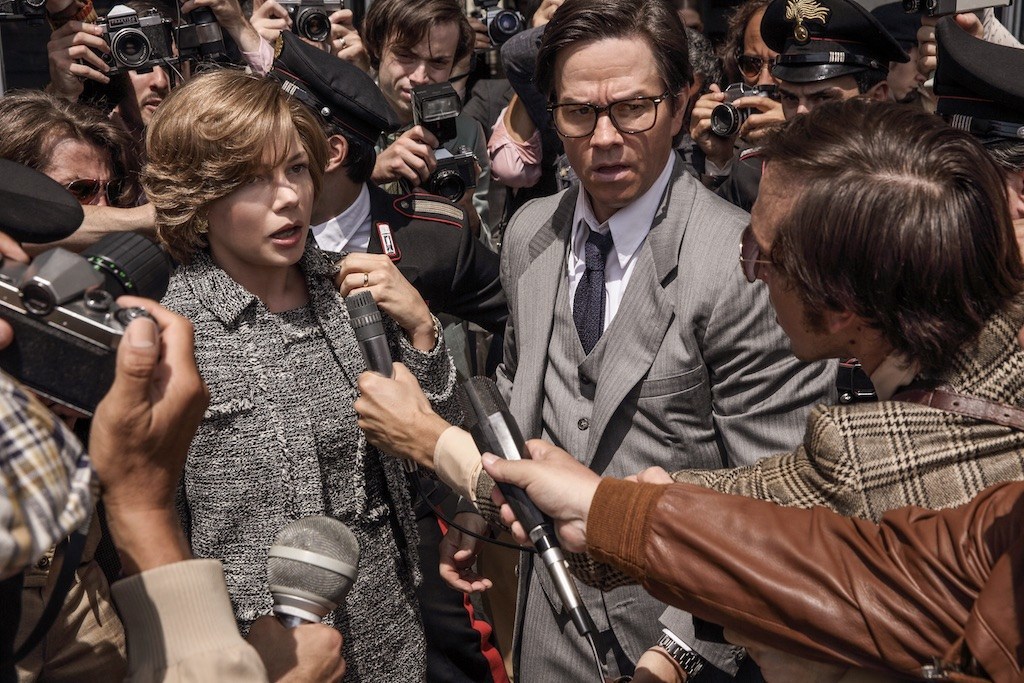
Christopher Plummer was allegedly director Ridley Scott’s first choice to play billionaire J. Paul Getty and I can see why. He has the bearing, the voice, the gravitas. He’s not just great as Getty—although he is—he seems inevitable. We’ll never know what Kevin Spacey—who was replaced at the eleventh hour after sexual abuse allegations against him emerged—would have done with the part. Odds are, he would’ve done that Spacey thing, which is to say, he’d ham it up enjoyably, italicize every bit of irony, and never let you forget that you were watching a capital P performance (the bad makeup, on display in an early version of the trailer, wouldn’t have helped). I’m sure he would’ve been fun, in his own way—but he certainly wouldn’t have felt inevitable.
I’ve got to hand it to Scott and crew. When I first found out that they were replacing Spacey with Plummer with only six weeks (!) to go before the film’s release date, I thought it was impossible (I even tweeted out a GIF of Wally Shawn’s “inconceivable!” from The Princess Bride). How wrong I was. Sure, you might spend the first few minutes of the film trying to suss out how they did it—which scenes are reshoots? which are just canny bits of CGI?—but after that, you’ll be too involved in the action to care.
All the Money in the World isn’t a great film but it’s a very enjoyable one, mounted with suspense and smarts and an abundance of style by that pro’s pro Ridley Scott. Both he and Plummer have a way of making this all look easy.
The story is a famous one—although if you don’t know much about the kidnapping of John “Paul” Getty III (Charlie Plummer), I’d avoid the Wikipedia page. There were a few moments of great tension that didn’t quite land for me, because I knew the real story too well.
Here’s what happened: In 1973, Paul, who was J. Paul Getty’s favorite grandchild and, at the time, a louche teenager with long hair and a bell-bottomed lounge suit, is kidnapped in Rome. His ransom is set at $17 million dollars. Everyone assumes that Paul’s mother, Gail (Michelle Williams) can afford to pay, even though she’s long divorced from Paul’s wastrel father (Andrew Buchan). But it turns out that J. Paul Getty is not just the richest, but the stingiest man alive (the two are clearly not unrelated). Gail has received no endowment and is essentially broke. She begs Getty for the money. He refuses, noting that he has 14 grandchildren—and that if he paid the ransom this time, they’d all get kidnapped.
Getty’s logic seems unassailable, in a way, except we see that this is his way of life—covetously collecting art and real estate and steadfastly refusing to give anything away to charity, often with the same excuse: If I gave to one, I’d have to give to all. He does, however, loan out his beefy director of security, Fletcher Chase (Mark Wahlberg), to help track down the kidnappers.
The film toggles back and forth between young Paul and his terrifying ordeal, scenes of Getty being a cheap (if brilliant) bastard, and the relentless Gail, as she works with Chase and the Roman police.
As the preternaturally self-possessed Gail, Williams gives a brilliant performance. It’s true, her Jackie O-like accent is a little extra, as the kids say. But she is a remarkably expressive and nuanced actress. Gail was chastised by the public and press at the time for not crying enough, but Williams shows the desperation beneath Gail’s steely resolve. It’s a shame, though, that she has to act opposite the stiff Wahlberg, who doesn’t do particularly distinguished work here. (Kristy Puchko of Pajiba jokingly remarked that he seems like the one who was edited in at the last minute.)
All in all, I was seduced by this film. It’s a gripping suspense thriller and a fabulous portrait of the bottomless nature of greed. I’ve got to tip my hat to those wily gents Ridley Scott and Christopher Plummer. Damned if they didn’t pull it off.
